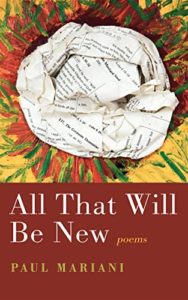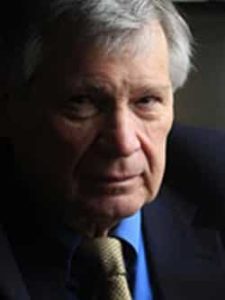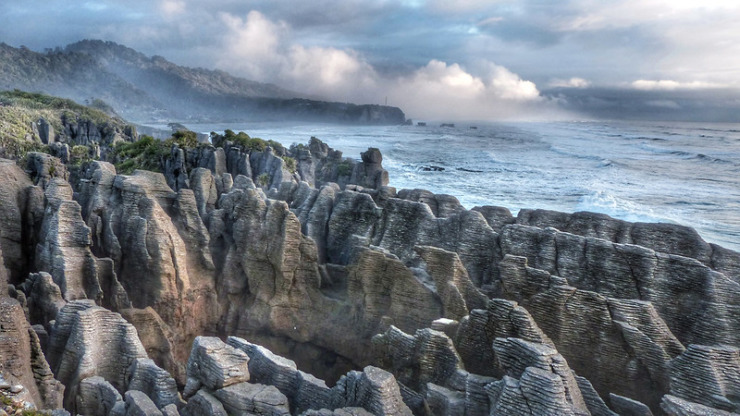Paul Mariani finds hope, even in the end of things
The news has always been filled with what sells — bad news. But for more than two years, our steady news diet has been pandemic, riots, shootings, inflation, war and invasion, left-wing and right-wing extremism, hate crimes, immigration battles, and division. We sometimes feel we’re in the middle of a civil war in which few shots are being fired but the carnage is nonetheless terrible.
In his ninth collection, All That Will Be New, poet Paul Mariani expresses this sense of “It’s all coming apart,” this era he calls “Covid-killing time,” but he also finds reasons to hope. And he sometimes finds reasons to laugh, especially at himself.
Storms, like the one Mariani describes in “Northeaster at Prout’s Neck,” symbolize unraveling and destruction. He describes this scene along the Maine seacoast, the experience of the storm soon becoming a kind of meditation about the Civil War, the “unforgiving years of Reconstruction,” and the breakdown of established social relations.
And this isn’t something that only happened 160 years ago; it is still happening today. Tragedies are happening all the time, from the deaths of friends and loved ones to the required felling of a beloved catalpa tree.
Despite the tragedies, or perhaps because of them, he finds hope. Mariani sees hope in nature, and he especially finds hope in art. Several of the poems are inspired by paintings: wheat fields by Vincent Van Gogh; Georges Seurat’s A Sunday Afternoon on the Island of La Grande Jatte; Picasso’s Guernica (a subject more about destruction than hope); Caravaggio’s The Calling of St. Matthew; and others. He finds hope, too, in other poets — William Carlos Williams, Ezra Pound, Dante, Emily Dickinson, and Philip Levine. This is one of two poems in the collection connected to Williams.
Snow Moon Over Singer Island

ly up the beach, the February snow moon like the host
the priest raises shining now along the solemn coast,
transfiguring the Atlantic waters down below.
I sat there transfixed, as if for once at peace
With what I had the sense this time around
To see, things that all my life have ground
Me down at last drifting off to the east-northeast.
But what words can net what one feels in these too-brief
moments? Grasshopper transcendence, the poet called it,
those translucent wings whirring up into the Sunday light
before the shouts of strangers force their entry like some thief.
Show us a sign, we say, show us what we think we want to see.
Though do we even know what such a sign would be?
Or is the blessed thing already there before us, you and me,
And all we really need to see it are the eyes to see?

Paul Mariani
“The poet” referred to in line 10 is Williams. Mariani discusses this idea of “grasshopper transcendence” in his biography The Whole Harmonium: The Life of Wallace Stevens.
Mariani is University Professor Emeritus at Boston College. Born in 1940 in New York City and raised on Long Island, he was the oldest of seven children. He has published several biographies and eight poetry collections, of which All That Will Be New is the latest. His biographies include works on William Carlos Williams, Gerard Manley Hopkins, Wallace Stevens, John Berryman, Robert Lowell, and Hart Crane.
His awards and honors include a Guggenheim Fellowship, several fellowships from the National Endowment for the Arts and National Endowment for the Humanities, the John Ciardi Award for Lifetime Achievement in Poetry, and the Flannery O’Connor Lifetime Achievement Award.
This idea of “things coming apart,” many say, is something typically associated with old age. And yet, it may be more than that. In the case of All That Will Be New, we should heed the words of age, and especially the words that hope can be found in the darkest of days — if we look for it.
Related:
Poet and Poems: Paul Mariani and “Ordinary Time”
“The Whole Harmonium: The Life of Wallace Stevens” by Paul Mariani
Photo by Bernard Spragg, Creative Commons, via Flickr. Post by Glynn Young.
How to Read a Poem uses images like the mouse, the hive, the switch (from the Billy Collins poem)—to guide readers into new ways of understanding poems. Anthology included.
“I require all our incoming poetry students—in the MFA I direct—to buy and read this book.”
—Jeanetta Calhoun Mish
- Longfellow’s “Paul Revere’s Ride”: Creating a National Legend - April 17, 2025
- Poets and Poems: Katie Kalisz and “Flu Season” - April 15, 2025
- Poets and Poems: Michelle Ortega and “When You Ask Me, Why Paris?” - April 10, 2025


Lynn D. Morrissey says
Thank you so much, Glynn. Im unfamiliar with this poet, and the poem you show here is breathtaking. Thank you for this introduction, and for reason to hope through the beauty of poetry!
Lynn